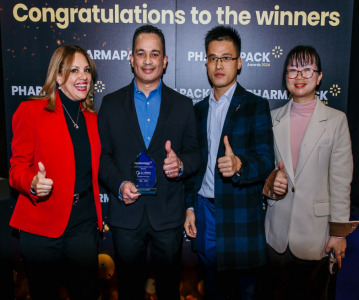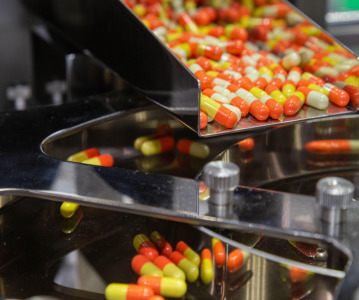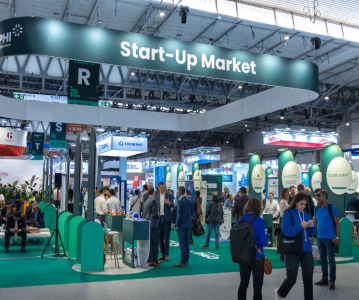CDMO - Health is a Joint Project: Connect to Frankfurt on-demand
.png)
In this Connect to Frankfurt session, Emanuele Agnese, Business Development Manager and Pietro Allegrini, R&D Director at Indena, present the ways in which a reliable manufacturing partner in the pursuit of better health outcomes for patients and pharmaceutical companies alike.
As part of our conference track Manufacturing Excellence, learn how Indena has serviced their partners with comprehensive cGMP practices, supporting the development of highly potent APIs with several technological solutions highlighted with various case studies.
Indena’s start
Founded in 1921, Indena originally focused on the research, development, and manufacturing of complex molecules derived from natural sources. Indena’s first CDMO experience begins with the discovery of paclitaxel in the bark of the pacific yew tree. A chemotherapy medication under the brand name Taxol, paclitaxel became part of a national effort against cancer when President Nixon signed a USD $1.6 billion grant towards cancer research. However, the increased interest in paclitaxel soon posed a problem for manufacturers. As Allegrini explains, the isolation of paclitaxel from the bark of the Pacific yew is not sustainable, with only a small amount of the active secondary metabolite available in the bark of each tree. A single cycle of treatment required cutting three 100-year old trees. Since the yew tree does not boast a very efficient photosynthetic biology, it is slow-growing and incapable to keep up with the demand for paclitaxel. Supply chain challenges related to a low number of resources available soon arose, leading manufacturers scrambling to find a solution.
Enter Pierre Potier. In 1988, Potier successfully achieved the first semi-synthesis of Taxol from 10-Deacetylbaccatin. Indena then achieved the industrialisation of this isolation process, further developing an original semi-synthesis procedure for paclitaxel and docetaxel. In its first CDMO experience, Indena supported a multinational pharmaceutical company with a sustainable supply chain for yew cultivars, a straightforward isolation method, and analytical control in compliance with stringent pharmaceutical criteria for purity and stability.
Allegrini termed the experience a win-win-win story for patients, pharmaceutical companies, and manufacturers, with the collaborative environment between researchers and manufacturers achieving both pharmaceutical availability for cancer patients and improvement of quality and HSE systems for manufacturers and developers.
Collaboration for better health outcomes
Throughout the session, Agnese and Allegrini present more case studies in which Indena collaborated with various pharmaceutical companies to deliver expert manufacturing capabilities to several projects. In one case study, Allegrini showcases Indena’s expertise in the chemical synthesis of highly potent APIs (HPAPIs). For one such HPAPI, it required complete synthesis in clinical phase I trials, with seven synthetic steps. However, lower throughputs for such compounds often lead to increased costs of and subsequently an API that costs more. Allegrini highlights Indena’s increased yield productivity with improved throughput by up to 20 times the efficiency, streamlining various processes throughout the synthesis process. Streamlined technology transfers were also achieved by Indena for an already commercial product. With throughput a key cost driver for the HPAPI due to plant occupation and related costs, a streamlined technology transfer with existing equipment aided in increasing throughput and lowering costs for the pharmaceutical company. As emphasized in this example, a reliable and collaborative manufacturing partner can assist in even the most expensive of projects where every dollar counts.
In another case study, Agnese takes us through Indena’s fermentation technological solutions to carry out living cells-based biotransformation, including the search for certain compounds to utilise in the fermentation process. When a strain of a certain natural compound required in a product’s fermentation could not be acquired from cell banks, Indena set out to deduce microorganisms that could potentially be utilised and tested to confirm the identity of the secondary metabolite.
For another client, Indena’s background in natural sources and the botanical supply chain helped them become the first Italian manufacturer authorized to synthesize CBD from hemp, alleviating regulatory burdens for other players in the supply chain regarding biomass and final API handling.
Throughout the session, Agnese and Allegrini continue to emphasize the importance of a dedicated manufacturing partner with the capabilities to meet one’s requirements and work in a collaborative and open manner. This sentiment is carried through each case study they present, culminating in a final call to join together in the journey towards better health outcomes for all.
Discover more Connect to Frankfurt on-demand sessions here.
Related News
-
News Pharmapack Awards 2024 Patient-Centric Design Award Winner – Dr Ferrer BioPharma
The 2024 Pharmapack Awards celebrated the best in innovation and design for the pharmaceutical packaging and drug delivery industry on January 24, 2024. -
News Women in Pharma: Minding the Gap at Pharmapack 2024
2024 marks the first year Pharmapack will host a Diversity track dedicated to bridging the gap within the pharmaceutical packaging and drug delivery sector. The track includes a panel discussion on 'Enabling Diversity in the Workplace,' focused... -
News Pharmapack Awards 2024 - Celebrating Packaging and Drug Delivery Innovation
The 2024 Pharmapack Innovation Awards ceremony celebrated the best in pharmaceutical packaging and drug delivery innovation at all levels. The awards were held on January 24, 2024 at the Paris Expo Porte de Versailles. -
News Pharmapack 2024 - From the Floor
Paris once again welcomes Europe’s leading trade show in pharmaceutical packaging and drug delivery innovation. Join our content team as Pharmapack 2024 opens its doors to leading experts and innovators in pharmaceutical packaging and drug delive... -
News CPHI Barcelona 2023: Partnering for Success – Managing Outsourcing Relationships to Optimise Manufacturing Operations
During CPHI Barcelona 2023, insightful content sessions offered attendees the chance to explore trending topics with expert speakers and panellists. Here, we summarise what the pharma industry and supply chain are talking about the most. -
News CPHI Barcelona 2023: Loading Potential – Artificial Intelligence for Pharma Manufacturing
During CPHI Barcelona 2023, insightful content sessions offered attendees the chance to explore trending topics with expert speakers and panellists. Here, we summarise what the pharma industry and supply chain are talking about the most. -
News Pharmaceutical industry supports COP28 health stance in joint statement
As COP28 takes place over this week in Dubai, UAE, several bodies in the pharmaceutical and health industries have come together to announce support of key movements in sustainability in the sector, and to recognise sustainability as a health issue.&nb... -
News CPHI Podcast Series: Start-ups take centre stage at CPHI Barcelona
The first episode of the CPHI Podcast Series since we attended CPHI Barcelona in October covers the Start-up market at the event, with expert Matthew Wise joining Editor Lucy Chard to discuss the event.
Position your company at the heart of the global Pharma industry with a CPHI Online membership
-
Your products and solutions visible to thousands of visitors within the largest Pharma marketplace
-
Generate high-quality, engaged leads for your business, all year round
-
Promote your business as the industry’s thought-leader by hosting your reports, brochures and videos within your profile
-
Your company’s profile boosted at all participating CPHI events
-
An easy-to-use platform with a detailed dashboard showing your leads and performance





.png)

